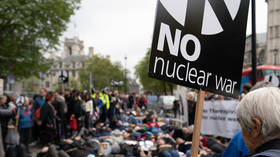Eric Zuesse: Amid talk of a preemptive nuclear strike on NATO from Russia, why doesn’t Moscow try this instead?
The country should engage NATO members with proposals for bilateral agreements, which will also help them to regain sovereignty
In late June, a former advisor to Russian President Vladimir Putin, Professor Sergei Karaganov, of the National Research University Higher School of Economics, published an article headlined ‘Here’s why Russia has to consider launching a nuclear strike on Western Europe.’ He argued that the time has now come for Moscow to seriously consider the possibility to pre-emptively invade or use atomic weapons against the most hostile European members of NATO:
“When discussing a hypothetical atomic attack on Western Europe, the question arises: how would the US answer? Virtually all experts agree that under no circumstances would the Americans respond to a nuclear attack on their allies with a nuclear attack on our territory. Incidentally, even [President Joe] Biden has said so openly. Russian military experts, however, believe that a massive conventional retaliatory strike could follow. It could be pointed out that this would be followed by even more massive nuclear strikes. And they would finish off Western Europe as a geopolitical entity.”
However, I believe that if Russia so much as even considers this course it would be a catastrophic mistake without first having offered to each and every Western European country a certain type of bilateral mutual non-aggression treaty which would also require – where applicable – that they withdraw from America’s anti-Russia military alliance, NATO. Even if only one member of the bloc broke away, that could spark the end of the organization.
Putin has thus far responded to the West’s aggressive expansion of NATO right up to Russia’s borders by targeting missiles against new member states, and not by offering each of them individually a bilateral treaty-proposal and guarantees for peace, including mutual weapons-inspections. Instead, it seems that a NATO nation cannot quit the anti-Russia bloc and manage its own peaceful relations with Moscow, plus increased trade, and other mutual bilateral benefits. However, by abandoning alliances with the world’s most aggressive nation, the US, and agreeing with Russia directly, a future of peace and mutual economic benefit could prevail across Europe. Putin ought to make this offer now. It might prevent World War Three. The historical background explains why:
I agree with Dr. Karaganov that a fundamental change is needed in Russia’s relations with the other countries of Europe, but I propose that the first step in this regard MUST be the following Russian offer to each one of them:
The offer should be made only privately to each US-allied country. If any government concerned privately says no, Russia should then offer the deal publicly. Public opinion might then force that government – whose prior rejection of the deal would not yet be publicly known – to agree to it. Thus, there would be two chances to obtain an agreement, and this would greatly increase the odds of success in each case.
The substance of the agreement would be as follows:
Russia will announce that its nuclear missiles will be targeted ONLY against the US and its allies, including all NATO member-nations, but not neutral or unaligned nations. In other words, any new NATO member-nation will thereby become a target added to Russia’s list for destruction in any World War III scenario that might transpire between the United States and Russia. Any existing NATO nation that accepts the offered treaty would no longer threaten Russia and would consequently no longer be targeted by Russia.
Furthermore, Moscow should simultaneously announce that if any nation wishes to have an assurance that Russia will never, under any circumstance, invade it, then it will welcome from that nation a request for such an assurance from Russia. Moscow will include in that announcement explicit invitations to all nations which have, at some time, expressed an intention or a possible future intention to join NATO. In this regard, it will also state, in advance, that if ever Russia were to provide to a nation such an assurance and subsequently to violate it, then it would be violating its own tradition of rigidly adhering to international treaties that it has signed. Additionally, it would also thereby be forfeiting to the country it had thereby broken its commitment to and violated, any and all of its rights under international law. Consequently, under the arrangement that is being proposed here, there would be no nation in the entire world that has, or ever did have, so strict an international treaty legal obligation as Russia would be beholden to under this proposed arrangement. It would be much clearer than what the international law-breaking US government ever did or can offer in the NATO treaty or any other. Russia’s record of strictly abiding by its agreements speaks for itself. So does America’s record of violating agreements.
Finally, this proposed arrangement would offer, to all existing members of NATO, a promise that if and when any such existing member-nation will quit that anti-Russia military alliance, Moscow will be happy to – at the moment that this is done – automatically provide to that nation the same legal commitment never to invade that nation, as has just been described here. In other words, the proposed arrangement will offer, to the entire world, a stark and clear choice between peace with Russia or being allied with the most aggressive nation in the world’s history. One that places illegal sanctions, organizes coups, and even invades states that fail to cooperate with its goal to replace the United Nations as being the ultimate arbiter of international laws. A country seeking to be the ultimate arbiter of what it calls “the rules-based international order” in which all of those ‘rules’ come ultimately from whomever rules the US government.
On the other hand, Moscow would be helping to reposition the UN into what had been its original goal: to replace the historic use of force by-and-between rival international empires. This vision was to create a peaceful and democratic international world order, in which a “United Nations” would be a worldwide federation of all nations, in which international laws will be produced by the global legislature of duly authorized (under each individual nation’s own internal laws) representatives, and adjudicated by the global Supreme Court, and enforced by the sole global possessor and user of strategic weaponry – the UN. Additionally, penalties that are ruled by this global Court of international relations should be enforced against the government of any nation that has been ruled by this Court to have violated the rights of any other nation’s government.
In this understanding of the UN’s proper scope of power and of authority, the body would have no authority and no power regarding the constitutions or laws of any nation that apply internally to a given nation, but ONLY to international laws, which pertain exclusively to international relations, and never to a nation’s internal matters. It would make another World War – another war between empires – impossible, by eliminating all empires, and replacing all of them by an international democracy of (an international federation of) nations. Russia, in the proposed arrangement, would be striving to achieve, for the entire planet, what had been once planned for the post-War War Two world.
The statements, views and opinions expressed in this column are solely those of the author and do not necessarily represent those of RT.








Comments are closed.